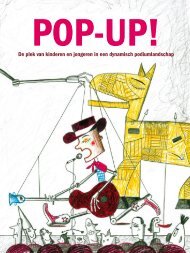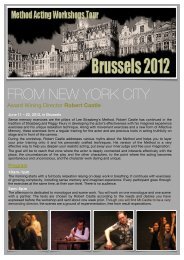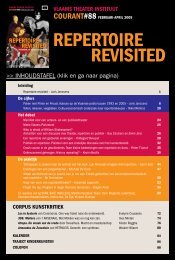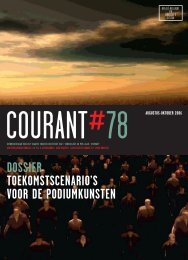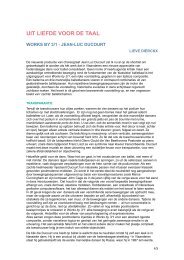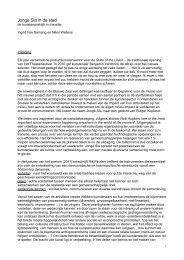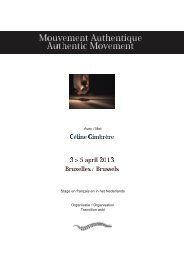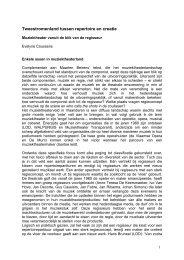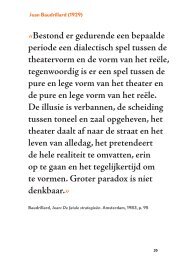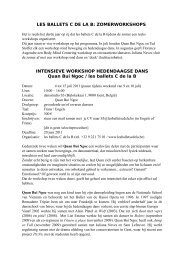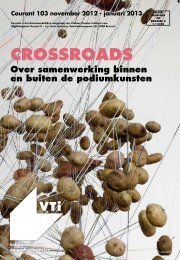music theatre in flanders - Muziekcentrum Vlaanderen
music theatre in flanders - Muziekcentrum Vlaanderen
music theatre in flanders - Muziekcentrum Vlaanderen
You also want an ePaper? Increase the reach of your titles
YUMPU automatically turns print PDFs into web optimized ePapers that Google loves.
prOduCTIVe AMbIGuITy<br />
All th<strong>in</strong>gs considered, the battle for a new sound <strong>in</strong> the <strong>theatre</strong><br />
that feverishly broke out at the end of the 1980s, can be said to<br />
have been successful. Numerous radical experiments have preceded<br />
the current <strong>music</strong> <strong>theatre</strong> companies, with even a series<br />
of operas for the Belgian radio and television way before Bob<br />
Ashley’s so-called television operas <strong>in</strong> the US <strong>in</strong> the 1980s. Today,<br />
Flemish <strong>music</strong> <strong>theatre</strong> is an unprecedented breed<strong>in</strong>g ground<br />
thanks to successful def<strong>in</strong>ition policies. The vagueness and confusion<br />
surround<strong>in</strong>g its def<strong>in</strong>ition has procured a productive gap<br />
that is presently stopped by at least n<strong>in</strong>e government supported<br />
companies and various small <strong>in</strong>itiatives. The only <strong>in</strong>variable th<strong>in</strong>g<br />
<strong>in</strong> <strong>music</strong> <strong>theatre</strong> is, perhaps, that it has become an organization<br />
model that offers a refuge to experimental and somewhat more<br />
difficult <strong>theatre</strong> that th<strong>in</strong>ks and operates through <strong>music</strong>.<br />
Historically speak<strong>in</strong>g, this productive ambiguity has been<br />
around s<strong>in</strong>ce the evolution of the 16 th -century dramma per <strong>music</strong>a<br />
(or even earlier) up to the 19 th and 20 th -century <strong>music</strong> drama<br />
boom. As a <strong>music</strong> <strong>theatre</strong> genre <strong>in</strong> the broadest def<strong>in</strong>ition, <strong>music</strong>al<br />
too has made its claims on <strong>music</strong> and the s<strong>in</strong>g<strong>in</strong>g voice, despite<br />
its more advanced <strong>in</strong>stitutionalization and def<strong>in</strong>ition. In the<br />
debate, the <strong>music</strong>al fences with its social function by compar<strong>in</strong>g<br />
it to 19 th -century Italian belcanto-opera. In spite of the historical<br />
misconception, which is based on an <strong>in</strong>tentionally reduced notion,<br />
the argument serves the purpose of a similar productive ambiguity<br />
<strong>in</strong> the expansion of def<strong>in</strong>itions, as well as <strong>in</strong> the repeated negation<br />
of the alleged ‘old’ opera model. This vagueness is meant to<br />
nourish the need to anchor <strong>music</strong>al more firmly <strong>in</strong> Flemish cultural<br />
policy. The desire also rema<strong>in</strong>s to perpetuate the <strong>music</strong>al as<br />
an <strong>in</strong>stitution through mature tuition of multi-talented perform<strong>in</strong>g<br />
artists. As a result, the <strong>music</strong>al has got stuck <strong>in</strong> the same urge for<br />
emancipation as <strong>music</strong> <strong>theatre</strong> about twenty years ago. But con-<br />
sider<strong>in</strong>g its dependence on commercial strategies, the question<br />
rema<strong>in</strong>s whether an experimental <strong>music</strong>al scene will be capable<br />
of creat<strong>in</strong>g comparable historical awareness and self-reflection<br />
as <strong>music</strong> <strong>theatre</strong> did.<br />
The FuTure OF MuSIC TheATre<br />
As a result of the ongo<strong>in</strong>g self-legitimization through different, uncompromis<strong>in</strong>g<br />
artistic trajectories, project-based formal experiments<br />
and <strong>in</strong>novative forms of collaboration, the roads are open<br />
more than ever before. Thanks to a successful def<strong>in</strong>ition policy,<br />
certa<strong>in</strong> notions of the mean<strong>in</strong>g of <strong>music</strong> <strong>theatre</strong> have begun to<br />
live their own lives <strong>in</strong> cultural policy. The confusion of def<strong>in</strong>itions<br />
perpetuates the need of more f<strong>in</strong>ancial resources. Conversely,<br />
we are slowly reach<strong>in</strong>g a po<strong>in</strong>t at which it is possible to def<strong>in</strong>e<br />
constant <strong>in</strong>dicators, and at which cautious <strong>in</strong>stitutionalisation of<br />
<strong>music</strong> <strong>theatre</strong> is becom<strong>in</strong>g plausible. But for bona fide, formal<br />
def<strong>in</strong>itions the landscape is still too much <strong>in</strong> motion.<br />
One side-effect of the def<strong>in</strong>ition policy is that the major<br />
<strong>music</strong> <strong>theatre</strong> houses will focus more on self-preservation.<br />
These houses have taken up the dist<strong>in</strong>ct role of offer<strong>in</strong>g growth<br />
trajectories to artists <strong>in</strong> residence (such as Dick Van der Harst,<br />
Jan Kuijken, Dom<strong>in</strong>ique Pauwels and Kris Defoort at LOD; Wim<br />
Henderickx, Peter Maxwell Davies, Jan Van Outryve and Eric<br />
Sleichim at Muziektheater Transparant). The major advantage<br />
is that companies can guarantee sufficient time and means to<br />
develop new productions, as <strong>music</strong> <strong>theatre</strong> requires a relatively<br />
long production time, as well as ample rehearsal time and space<br />
for <strong>music</strong>ians, s<strong>in</strong>gers and actors. On the other hand, the system<br />
has the setback of privileg<strong>in</strong>g the means for an elite of composers<br />
and perform<strong>in</strong>g artists over a long period, even though they have<br />
proven their artistic worth and merits <strong>in</strong> the development of<br />
50 51<br />
table of contents



